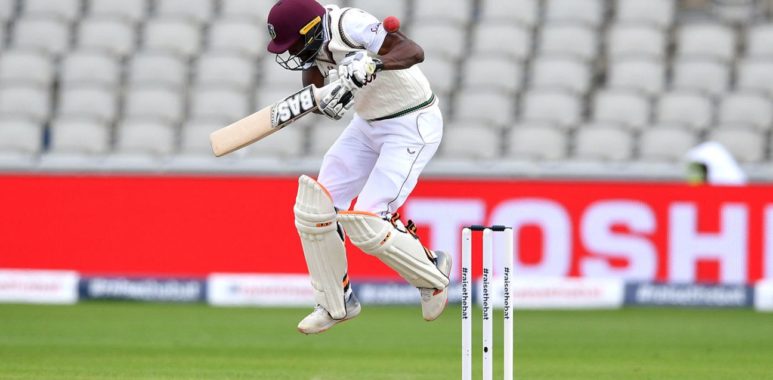
Brittle batting leaves West Indies under unanticipated pressure
When you are in a spot, you would bank on Jason Holder, wouldn’t you? One of the two best allrounders in Test cricket, along with Ben Stokes, Holder has shown most times the demeanour, maturity, understanding and skills – with ball and bat – to seize opportunities. He may not have done it as frequently as Stokes, but Holder shares a propensity to be the catalyst for his team’s Test victories.
So on Sunday afternoon, West Indies were in a spot, thanks once again to Stuart Broad, who had resuscitated a flat-lining Test match with the second new ball. Wicketless in the morning, but surging through his second wind, he picked three key wickets in successive overs as West Indies were left needing another 18 runs to avoid the follow-on, with just Holder and Roston Chase the remaining specialist batsmen.
Ten runs shy of the target, Holder faced Chris Woakes. Moments earlier, Stokes had walked off the field, holding his stomach. Holder took an off-stump guard to cover Woakes’ fourth-stump line. He knew it would be a good length, moving away. He did not need to play the ball. Yet he poked an easy catch to slip. Holder had created another turning point. This time for England.
Still 21.4 overs overs remained in the evening. West Indies needed to eat into that allocation to deny England the upper hand with a full day’s play still left.
West Indies were never meant to be this desperate. That pressure was England’s, at lunch and tea. Yet if Test cricket teaches you one thing, it is about having a positive mindset at all times. It’s about controlling the controllables and focusing on the plan. And if you ever lose the plot, even momentarily, it’s about getting it straight back on track.
Broad showed that today. He and Stokes attempted to dry out the runs before tea as Shamarh Brooks and Chase were looking to cash in on a flat pitch, soft seam and a ball without shine.
But as soon as Joe Root took the new ball, Broad corrected his lines, went over the wicket, pitched fuller, made use of the hard seam, at times wobbled it, planted doubts in the well-set minds of Brooks and others, and just like that, he put England back in the match.
To think that Broad could do this without the usual chanting of the Old Trafford full house shows why he has remained a prized asset for England this decade. West Indies can learn a lot from Broad: he said he was hungry after being dropped in Southampton. Today that hunger showed.
Stokes and Dom Sibley showed that same perseverance on the first two days when they batted with an over-my-dead-body attitude. Yeah, it was boring. But if it had not rained on Saturday, England would have realised the true worth of that huge partnership. Both batsmen were determined to convert the starts and make it big. Make it count.
That pair were the only two of England’s top-six to reach 25 in the first innings, compared to five for West Indies. But between them they made 296 runs, while Windies’ top two run-makers – Brooks and Kraigg Brathwaite – made less than half of that, 143 runs.
Yes, West Indies did have partnerships, but they did not prosper when it mattered the most. Brooks was their best batsman today, playing with control, command and using the wrists to flick and push shots into the wide gaps effortlessly. When Stokes tirelessly bent his back, banging in short-pitched deliveries, while aiming for the throat, Brooke ducked and weaved without breaking any sweat most times.
He tamed the challenge of Dom Bess’s flat offbreaks by playing the spinner on the front foot for the most part, and rocking back to cut sharply for easy runs. But as soon Broad took the new ball, Brooks suddenly seemed reluctant to push forward with the same confidence. He had done so, as he later admitted, he would not have been trapped plumb lbw for 68.
ALSO READ: Broad – England will sacrifice runs for victory chance
Brooks is 31 and is playing in his fifth Test. In 86 previous first-class matches, he has averaged 32, and in 146 innings he’s only faced 200 balls on six occasions, including his solitary Test century against Afghanistan last year.
Long innings are not yet his forte. Nor are they the forte of Jermaine Blackwood or even Shai Hope, who has struggled to play for time in spite of his now fading memories at Headingley in 2017.
A mindset to dig in for a long innings does not come naturally, however gifted a batsman is. It takes a lot of experience and hard work, allied with hunger and resolve. Not to mention skill.
But West Indies’ batsmen will get a second chance on Monday. They may need to bat for close to 85 overs as Broad, Woakes, Curran and Stokes steam in with renewed energy to tie this Test series. Can Windies batsmen withstand the collective pressure, play time and then figure out whether to go for the kill by chasing down the target?
Brian Lara did it consistently. Shivnarine Chanderpaul, too. They became greats because they could be trusted when the pressure was on.

